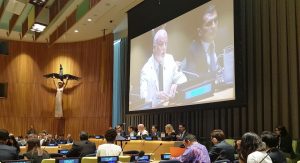As delivered
Statement by Peter Thomson, President of the UN General Assembly, for the High-level debate to observe the 25th anniversary of the assassination of Judge Giovanni Falcone
19 June 2017
Distinguished Ministers
USG Fedotov,
Ambassador Kitano,
Ambassador de Rocafort,
Excellencies,
Ladies and Gentlemen,
Welcome to this High-Level Debate marking the 25th anniversary of the assassination of Judge Giovanni Falcone, and focusing on implementation of the United Nations Convention against Transnational Organised Crime.
Today we pay tribute to those who have made the ultimate sacrifice in our fight against organised crime, and in particular Judge Giovanni Falcone.
Judge Falcone was a fearless and inspirational servant of the law.
He understood the enormous burden that organised crime places on societies, by inflicting terror and despair, violating human rights, and depriving citizens of security, dignity and opportunity.
Judge Falcone dedicated his life to the fight against organized crime. He targeted entire criminal syndicates rather than individual actors, using innovative and sophisticated tools in the pursuit of justice.
Judge Falcone recognised the importance of greater international cooperation in the fight against organised crime.
In fact in 1992, Judge Falcone participated in the first meeting of the Commission on Crime Prevention and Criminal Justice. And just one month later he was brutally assassinated.
His murder shocked the world and galvanised the international community to act. This action led to the adoption of the United Nations Convention against Transnational Organised Crime – the Palermo Convention – which encapsulated many of the tactics that Judge Falcone pioneered, taking them to law enforcement agencies across our world.
By providing a global framework to strengthen cross-border legal and judicial cooperation, the Palermo Convention has since facilitated complex multi-State operations that have cast a net over criminals across jurisdictions, and dismantled criminal groups by targeting the kingpins.
It has provided for the protection of witnesses, seizing of assets, use of specialised forensic investigative techniques, and the disruption of illegal financial flows by pursuing money laundering ventures.
Critically, it has also provided for the return of proceeds of crime to those who have been victimized.
In the years that have followed the adoption of the Palermo Convention, the General Assembly has passed a series of resolutions that have added to our tools to prevent crime and pursue criminal justice.
But of course, more is needed to combat organised crime.
The rapid-pace of innovation and technology has changed our world, and criminal groups have been quick to embrace sophisticated new techniques.
It is imperative therefore that we continue to build upon Judge Falcone’s legacy by exploring options to enhance our existing legal frameworks – particularly in light of the barbarous acts of terrorism that are being perpetrated across our world.
Judge Falcone understood that crime can thrive when education, hope and opportunity is lost. Therefore, we must ever examine ways to strengthen our efforts to combat organised crime, to strengthen rule of law, and to bring international criminals to justice.
It is in this spirit, that today’s High-Level Debate is being held, and I can think of no greater tribute to Judge Falcone than to ensure it serves as a meaningful opportunity to advance our implementation of the Palermo Convention.
Your Royal Highness, Excellencies, Ladies and Gentlemen,
Twenty-five years ago, the world lost an extraordinary legal mind to criminals who considered themselves above the law.
But today Judge Falcone’s legacy lives on through our global commitment to fight organised crime.
I wish you all the best in your deliberations today.
I thank you.


